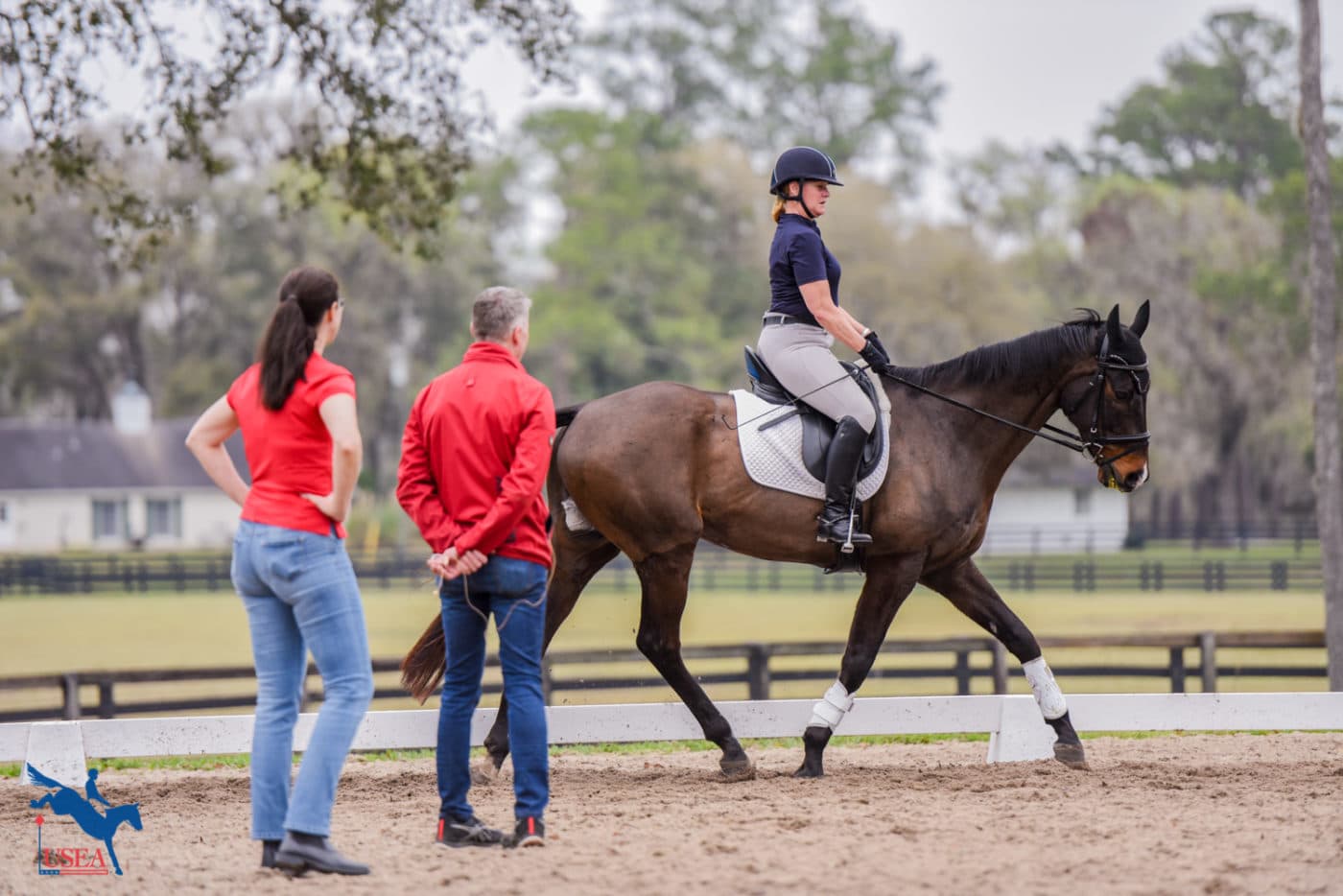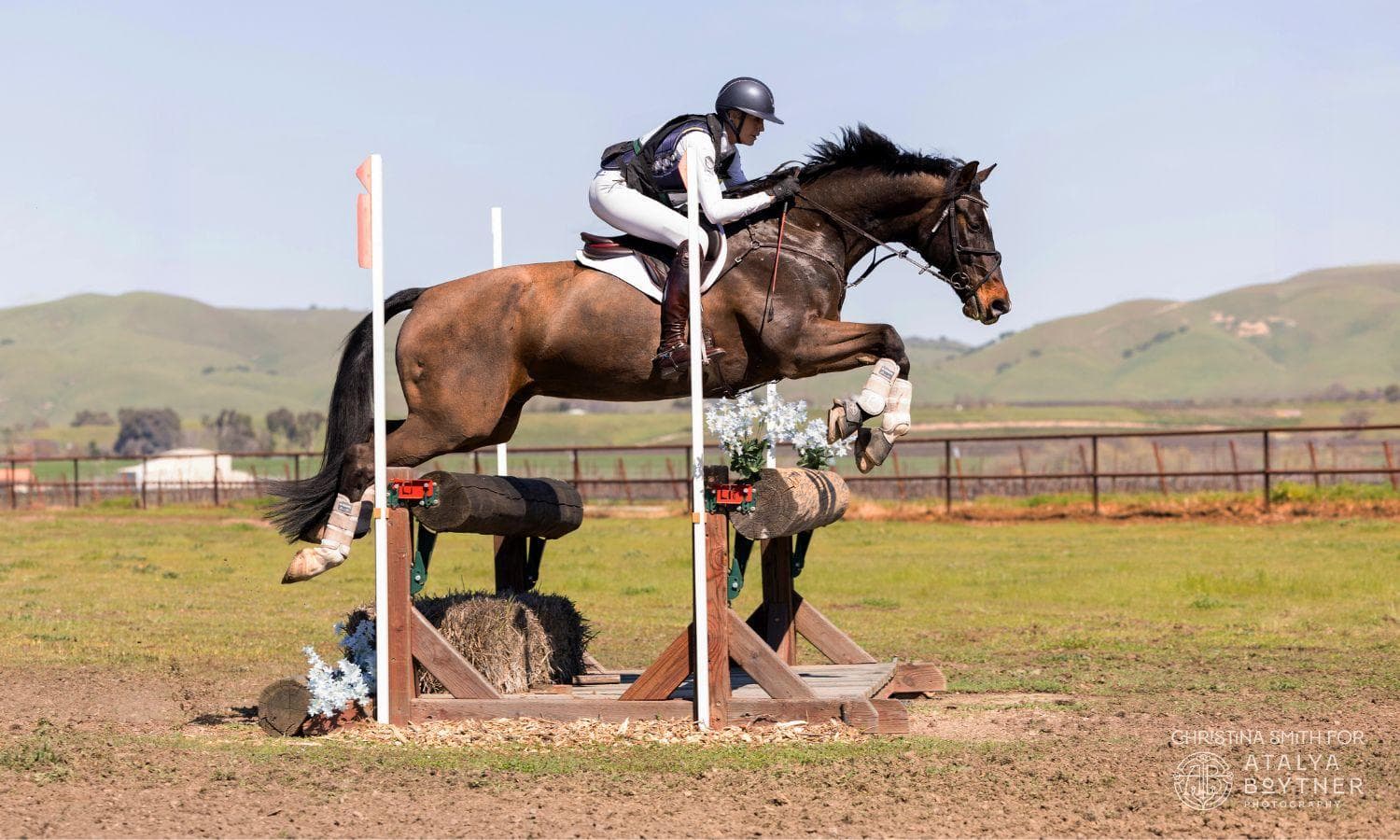Be the Best Instructor You Can Be: Preview the USEA Eventing Handbook at the 2022 USEA ICP Symposium

Attendees of the 2022 United States Eventing Association (USEA) Instructors’ Certification Program (ICP) Symposium at Barnstaple South Farm in Ocala, Florida on February 8-9 will get a first look at the all-new USEA Eventing Handbook by the Levels. This educational tool was developed over the course of two years and is loaded with materials and resources targeted for all levels of eventing professionals, instructors, and coaches.
The ICP Symposium has undergone a reboot and will feature an interactive and inclusive format that encourages participation and input from active professionals at all levels through a hands-on live teaching session. While geared towards eventing professionals, the ICP Symposium is open to all who wish to attend and will feature relevant information that all riders and eventing enthusiasts can learn from. As an added perk, early registrants will receive an advanced copy of the new USEA Eventing Handbook! Register for the ICP Symposium here.
What can you expect from the USEA Eventing Handbook? Through systematic research, the ICP faculty and committee have put together a resource for instructors, riders, parents, and more to inform and clarify for themselves the following:
- Their level of preparedness for the current level
- What they need to work on for the next level
- Where their weakness originates (through examination of previous levels)
- And how to choose effective instruction and coaching which aligns with the principles and concepts of the Handbook.
In preparation for its release, the USEA Eventing Handbook has undergone a thorough vetting by all of the major committees and branches of the USEA and USEF, including licensed officials, safety staff, membership, emerging athletes, and professional riders. The USEA Eventing Handbook was resoundingly endorsed by the USEA Board of Governors at the USEA Annual Meeting & Convention this past December. Overviews of each level from Starter to Advanced are outlined with instructor requirements as well as expectations and requirements in each of the three phases of competition.
Want a sneak peek? Check out this excerpt from the USEA Eventing Handbook below:
Training Principles
The training of the horse should be centered around the following principles:
- There is an over-arching theme in all training and work which produces a horse that is calm, forward, and straight.
- Understanding how a horse thinks and why it reacts are the guideposts for progressive training. Always ask: Why did the horse react in that way?
- The increments of the horse learning new skills or unlearning bad behavior is built on the progressive development of comprehension, trust, and confidence, in that order.
The amount and type of pressures the horse feels at any given moment are vast and varied. Understand what pressures are influencing the horse.
- Intentional pressure is best applied in incremental, progressive, measured amounts. Release of pressure should be immediate.
- The moment of learning in the horse’s brain occurs in the moment of the release of pressure. Therefore, the timing of the release of pressure is key to training.
The slow way is the fast way.
• It is essential that for every new skill the instructor takes the necessary time and patience to install comprehension, trust, and confidence in the horse, and in the rider, such that they can successfully execute each new skill before increasing the difficulty. Skipping steps dilutes the education, inevitably costs time, and jeopardizes a safe and successful outcome in the long run.
The infinite possible variations in the combination of riders, horses and situations requires infinite imagination to train.
Teaching Principles
Instructors should aim to build and develop a correct foundation in both horse and rider.
The highest priority must be given to:
- Producing horses that are correctly developed according to the training scale, that are sound mentally and physically, and are confident in their work and in their riders.
- Developing in their riders a correct, balanced, supple, effective, and independent seat for dressage and for jumping.
Instructors must stay current and up to date with all aspects of the sport, including:
- Changing trends in cross-country design and obstacles.
- Changes in show jumping course design.
- Changes in dressage requirements for various levels.
- Rule changes at all levels they are qualified to teach
- Advancements in safety protocol and procedures.
- Advancements in equine athlete health management and stable management.
- Continuing to develop their own knowledge base and skill set through the entirety of their career.
Instructors should have the ability to teach the exercises and movements for dressage and jumping that are required at each competition level, based on the following criteria:
- Using appropriate increments to introduce each new concept.
- In a progression appropriate for the skill set and comprehension of the rider and the horse, regardless of their level of competition.
- With a discerning eye for the biomechanics of horse and rider.
- Focusing on the harmonious development of horse and rider, leading to confidence between them.
- Choosing appropriate exercises that will improve the performance of the horse and rider and teaching and use them in a manner that will accomplish these goals.
The instructor must take responsibility for the safety of the students and the welfare of the horses.
- They should work to control the risk in all teaching situations and educate their students about potential risk, as students may not have adequate skills, knowledge, experience, or awareness to minimize their risk.
- The instructor should advise riders and horse owners in making decisions regarding competition level readiness or appropriateness. Instructors must clearly communicate their concerns to riders and horse owners regarding the ability of the rider or the horse to move up the levels.
- At all levels, the instructor should assess if both the horse and rider have the necessary skills, fitness, and preparedness required to compete safely at the level they are seeking to ride.
Linking the Flatwork to the Jumping
- It is essential to the safe and successful progression through the levels of eventing that instructors and riders understand and utilize the relationship between flatwork and jumping.
- The basic training of the horse in dressage is what prepares the horse to have the balance, strength and rideability for jumping, both in show jumping and on cross-country.
- The elements of the Training Scale: rhythm, suppleness, connection, impulsion, and straightness, should be employed and maintained in the training and riding over fences, and, as skills are developed, maintained throughout the jumping effort.
- This adherence to correct training of the horse and rider should not be compromised. Rushing a horse or rider through the levels without confirming foundational skills on the flat and over fences will ultimately hinder their development, and potentially jeopardize their safety.
The Independent Seat
A key focus of the teaching of riding for eventing should be on the development of the “Independent Seat” in the rider, as follows:
- The rider moves each part of their body independently in a balanced and coordinated way, without relying on any other part, and without balancing on the reins or the horse’s mouth.
- The rider sits in balance in the middle of the horse and follows the motion of the horse with a supple seat in three gaits, without relying on gripping with the legs or tension in the reins.
- The rider applies the aids clearly and effectively while controlling the position and the effect of their weight on the horse’s back.
- The rider is in control of the distribution of their weight and their balance. He or she can balance correctly over the horse’s center of gravity at any gait without tension or unsteadiness.
- For jumping:
- Independence from any use of the reins for balance is of the highest priority.
- The rider is able to balance over the horse’s center of gravity in a forward seat, half-seat or full seat for jumping, without using the reins for balance while maintaining elastic and independent contact with the horse’s mouth.
- The rider is able to apply the aids independently while controlling their balance and the position/influence of their weight in the forward seat, half-seat, and full seat for jumping.
A Correct Position = A Correct Foundation
The following description represents the ideal goals for rider position and balance, which will remain as ongoing targets and should be reinforced and confirmed as the rider progresses through the levels.
The lower leg position provides the base of support for the rider’s balance, and therefore must be correctly implemented and confirmed. The upper body should be centered over the lower leg and balanced over the middle of the horse.
The elements of a strong and effective leg position
include:
- The leg should elongate to the length of the stirrup and be allowed to drape the horse’s side with soft contact through the thigh, knee, and calf.
- The lower leg should have a flexed, elastic, and relaxed ankle which permits the weight of the leg to sink into a lowered heel, thus elongating the leg and weighting the ball of the foot on the back edge of the iron.
- The leg is positioned such that there is vertical alignment of the rider’s shoulder, hip, and heel, such that the upper body is centered over the lower leg and balanced over the middle of the horse.
- The stirrup length should be appropriate to accomplish all the above.
Elements of the correct position should include the following:
- The head should be erect with eyes looking ahead.
- A tall and erect upper body should be centered over the seat bones, with a flat back, and relaxed shoulder blades.
- The upper arm should hang relaxed at the rider’s side with an appropriate bend at the elbow, such that the forearm is aligned with the rein and the horse’s mouth. Fingers should be closed around the reins, thumbs flat on the top of the rein, which is secured between the thumb and first finger, wrists straight and relaxed.
- A relaxed, elastic arm and oscillating elbow is the mechanism which permits the rider to maintain contact with the horse’s mouth.
About the USEA Instructors’ Certification Program
Instructors are essential to the training of riders and horses for safe and educated participation in the sport of eventing. The USEA Instructors’ Certification Program (ICP) was initiated in 2002 to educate all levels of eventing instructors with crucial training principles upon which those instructors can continue to build throughout their teaching careers. ICP offers educational workshops and assessments by which both regular instructors, Level I through Level V, Young Event Horse (YEH) instructors, and Young Event Horse professional horse trainers can become ICP certified. Additional information about ICP’s goals, benefits, workshops, and assessments as well as names and contact information for current ICP-certified instructors, YEH instructors, and YEH professional horse trainers are available on the USEA website. Click here to learn more about the Instructors’ Certification Program.
The USEA would like to thank Stable Secretary and Parker Equine Insurance for sponsoring the Instructors’ Certification Program.















